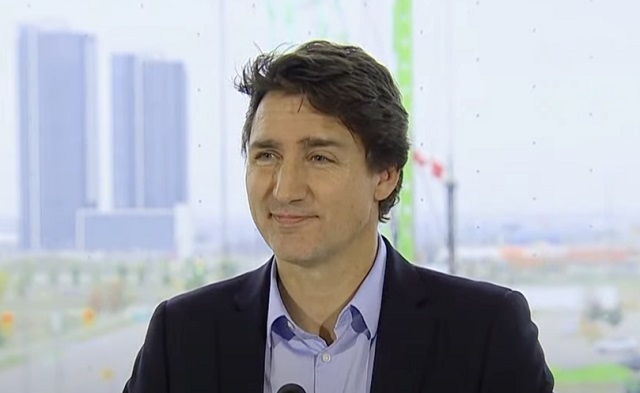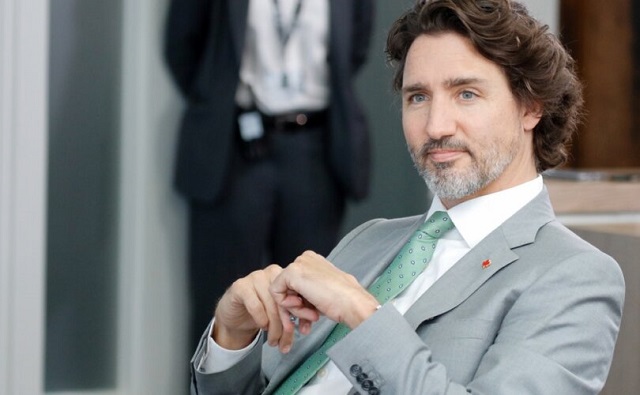Dan McTeague
The problem with Electric Vehicles
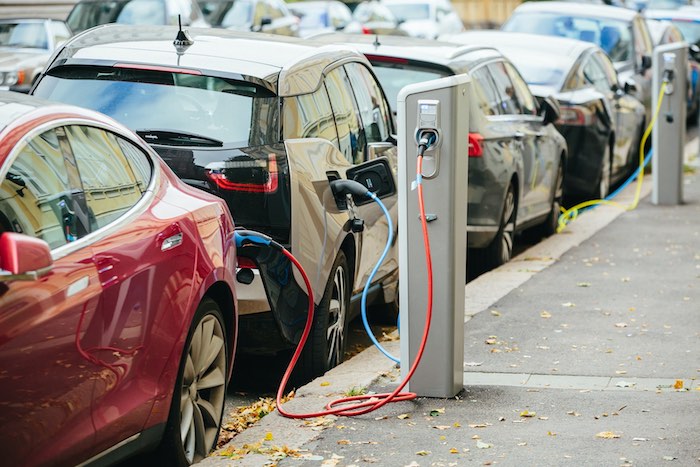
From Canadians for Affordable Energy
 Written By Dan McTeague
Written By Dan McTeague
For years now we’ve been hearing about the wonders of electric vehicles (EVs). Enormous amounts of money have been spent by governments to entice people to buy them, from subsidies to free charging stations.
Here in Canada, the Trudeau Liberals have already subsidised EVs at a cost of $1 billion. Another $680 million in the next five years will go toward the Zero Emission Vehicle Infrastructure Program (ZEVIP) to build an entire new infrastructure of charging stations.
In Ontario, Doug Ford’s government are ready “to become a North American hub for the next generation of electric vehicles,” and Ford’s PCs have recently committed to matching a $295 million investment from the Trudeau’s Liberals to retool the Ford Oakville Assembly Complex to become a global hub for battery electric vehicle production.
Electric vehicles are held up as the great green alternative to gas-powered vehicles. In fact, the federal government has set a mandatory target for all new light-duty cars and passenger trucks to be zero-emission by 2035 [read: electric and not gas-powered]. This is even more ambitious than their previous goal of 100% sales by 2040.
And, it seems, virtually the entire Canadian political class has either embraced or surrendered to the seemingly unstoppable momentum of EVs.
Well, here’s an interesting twist. Just the other week it was revealed that the Swiss government is considering legislation that would make it illegal for people to drive EVs over the winter except when it’s “absolutely necessary”.
Yes, you read that correctly. The Swiss government is discouraging people – to the point of making it illegal! – from driving their electric cars.
Why? Simple: there is not enough energy supply in Switzerland to power them.
Confused? How can this be?
Let me explain.
During the summer months, Switzerland gets around 60 percent of its energy from hydropower. But in the winter, hydro can’t produce enough energy, so the country imports a lot of electricity from France and Germany – both of which have long been dependent on Russian oil and gas imports.
Now that those “fossil fuels” have largely been cut off, these various European countries – not just Switzerland – are facing severe energy shortages this winter. This means that there won’t be enough electricity for people to charge their EVs. This move highlights the obvious flaw in this push towards electrification, especially EVs. While EVs don’t burn fuel, you need to charge the battery which, of course, requires energy.
Still confused? Right – perhaps you have never stopped to consider where the “energy” comes from that powers the EV charging stations?
Or did you just think that it was “magic” that powered the EVs?
Almost everywhere in the world, the charging stations are getting a lot of their power from oil and gas – the very same “fossil fuel” energy that EVs were supposed to replace. In many places, the power is coming from coal.
So to be clear, most countries typically need coal or oil or gas as a source of energy to power the charging stations, the very charging stations upon which many EV owners “power” their smug virtue signalling.
Some EV owners think, and even say out loud, that they are more concerned about the environment than you are. How can they say this? Well, this is because they have an electric vehicle, while you drive a gas-guzzling vehicle that is destroying the planet.
All the while, their very same electric vehicle most likely gets its energy, ultimately, from the same sort of greenhouse gas emitting fossil fuel that you do.
Ahem. (There are many other issues with EVs including the very expensive batteries with materials mined out of the earth, which is hardly a “zero emission” activity, or the reliability of the vehicles in our northern climate. More on that in another post.)
Consider too that here in Canada, the Trudeau government is pushing hard for us to move away from fossil fuels which provide reliable base power to our grid, towards renewable energy sources such as wind and solar, which are unreliable and intermittent.
Now imagine how this could play out over the next decades. If governments follow through on their plans to ban traditional gas-powered vehicles, it is their stated hope that everyone will have to drive an EV.
But, at the same time, governments want to shut down the traditional energy sector which – for the foreseeable future –provides most of the energy supply that powers EVs. If we’re forced to get all our power from wind and solar, that just means most people will never be able to drive anywhere.
We should consider what is happening in Switzerland as a warning shot. Our energy grids simply cannot provide enough power for electric vehicles, and this move towards EVs for everyone will fail. The Trudeau government is promoting a short-sighted, virtue-signalling policy that will cause significant societal harm along the way.
Maybe the disastrous situation in Europe this winter will lead to some long-overdue second thoughts about EVs, and the whole climate change agenda.
Dan McTeague
The Carbon Tax is part of a bigger plan to change the way you live
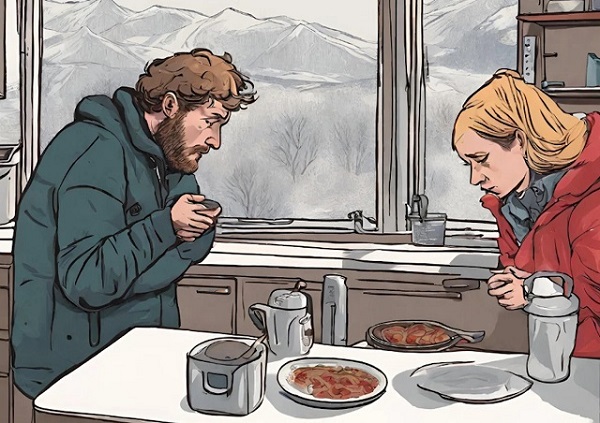
From Canadians for Affordable Energy
 Written By Dan McTeague
Written By Dan McTeague
On April 1, the carbon tax is going to rise from $65 per tonne to $80 per tonne, and it seems Canadians are noticing this jump more than those of the past few years.
Back in 2019, the Trudeau government announced its 566% carbon tax hike, starting at $15 per tonne and increasing yearly until 2030, when it would reach a staggering $170 per tonne. It received some attention at the time, but there was not a great deal of pushback. Presumably the numbers were too abstract to catch people’s attention and 2030 seemed a long way off.
But today things are different. It helps that Conservative Party leader Pierre Poilievre has been campaigning aggressively against the tax, with rallies and petitions to ‘Axe the Tax.’
Even Liberal premiers, such as Andrew Furey of Newfoundland and Labrador, have been pleading with Justin Trudeau to hit pause on the increase. In fact, a total of seven premiers in the country have spoken out against the tax, asking for a delay in its increase.
That’s because they recognize the tax is hurting Canadians. The cost of everything has gone up. It’s gotten so tough for businesses that some restaurants have begun adding a ‘carbon tax’ line item to the final bill. And if Canadians think it is bad now, wait until 2030 when the carbon tax will more than double its current rate.
The other reason people are more aware of the increase is because, well, the tax is working. It’s doing what it was designed to do, though maybe not in the way you might think. The goal is not simply to reduce emissions — in fact emissions have gone up. The goal is actually more nefarious than that. Let me explain.
The carbon tax is one of the pillars of the United Nations, World Economic Forum (WEF) Net-Zero-by 2050 agenda. In order to achieve their objective, they need all of us to fundamentally alter the way we live our daily lives. They want us to drive less, fly less, eat less meat (and more bugs). The carbon tax is a punitive means of achieving this.
In fact, the Trudeau government’s own Healthy Climate, Healthy Economy plan articulates the logic of the tax quite well when it says, “The principle is straightforward: a carbon price establishes how much businesses and households need to pay for their pollution. The higher the price, the greater the incentive to pollute less, conserve energy and invest in low-carbon solutions.”
It’s worth noting that they’re using a pretty loose definition of ‘pollution’ here, because we all know that carbon dioxide is not a pollutant — it is a gas which makes life on earth possible.
Even so, their intention is clearly stated — they figure that, if the price of fuelling up your car, going on a vacation and heating your home gets high enough, you will have to drastically alter the way you live your day-to-day life.
You will stop flying, cut back on driving, use fewer appliances. And really, you’ll just get used to having less money, until — following the slippery slope to its conclusion — you will “own nothing and be happy,” in the words of that infamous WEF tweet.
Which is to say, the carbon tax is a punishment for participating in normal economic activity, for living a regular life. Of course, for the time being you can catch a break if you live in Atlantic Canada and heat your home with oil, but if you live in the prairies and heat your home with natural gas, sorry, but you’re out of luck. You aren’t in a Liberal riding, after all!
And even then, the Liberals and their activist friends are banking on Canadians reducing their carbon emissions in order to achieve their Net Zero 2050 target.
So good for Pierre Poilievre, Andrew Furey and the other premiers for pushing back on the carbon tax.
But let’s not forget that, as noxious as it is, it’s only one small part of the Liberals’ Net Zero agenda.
Eliminating the carbon tax is merely cutting off one head of the hydra. If Canada’s political leaders are really concerned with affordability, then they need to target the monster’s heart.
It’s time that we not only axe the tax, but we need to scrap Net Zero.
Dan McTeague is President of Canadians for Affordable Energy
Dan McTeague
We are on a Net Zero collision course
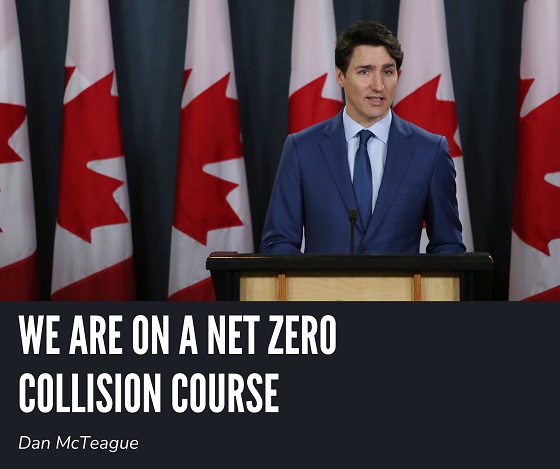

Welcome to 2024 where the threat of looming power outages in a resource-rich, developed country is a reality. And we have Justin Trudeau and his ideologically-driven caucus to thank for it.
In the past month alone, Alberta has issued four emergency alerts warning consumers to reduce demand or the grid could face the risk of rotating power outages. Residents were urged in one alert to immediately limit their electrical use to essential needs only.
According to the Alberta Energy System Operator (AESO,) which manages the grid, the alert was due to sustained cold temperatures. Alberta’s grid is more vulnerable in the winter due to the decreased opportunity to generate solar power with the shorter days and of course because during extreme cold, there is usually less opportunity for wind power generation.
Thank goodness for hydrocarbons since over those days more than 80% of Alberta’s power came from natural gas and to a lesser extent, coal.
This situation in Alberta should serve as a warning for the rest of the country.
That’s because the Trudeau government is aggressively moving forward with their Clean Electricity Regulations which mandate that by 2035 the Canadian grid be zero emissions. This means the entire country will increasingly be reliant on unreliable energy sources.
And last month, the Trudeau Liberals implemented their Electric Vehicle Availability Standard, which mandates all new light-duty cars and trucks must be zero emission by 2035 as well. In other words, after 2035 forget about purchasing a new gas-powered car or diesel-driven truck. Welcome to Trudeau’s Net Zero world!
Many Canadians are wondering how we are going to produce the energy to power our cars along with everything else in our lives, especially in the depths of the cold winter months.
And the answer is simply, “we can’t.”
We are on a collision course of the Liberal government’s making. In their ideological zeal to achieve Net Zero, they seem to have been completely unhinged from reality.
As I like to remind people, Canada contributes 1.5% of global greenhouse gas (GHG) emissions. Even if we halted all use of fossil fuels in our country it would have no global effect on world CO2 levels.
We can see the consequences of this pursuit of Net Zero, in Europe. Germany has frantically put coal power back on the grid in order to meet electricity demand. The UK is slamming the breaks on EVs and stepping up North Sea oil exploration. Italy is spending billions trying to fill its energy gaps with natural gas from Libya.
We are staring down the barrel of an upcoming election and if we want to ensure our quality of life, we need a major course correction. This does not mean delaying the implementation of EV regulations, or emissions caps, or even simply pushing back Net Zero target dates.
No. We need a party that will stand up against Net Zero and its related policies. We need a government that will see that this is a suicide mission we need to abandon entirely, not simply punt down the road.
Let’s hope we don’t have to wait for the worst-case scenario before Canadians finally realize the standard of living and access to affordable energy cannot be taken for granted. We truly are on a collision course with reality, due to ideological government policies that will have a crippling effect on our economy and way of life.
Dan McTeague is President of Canadians for Affordable Energy
-
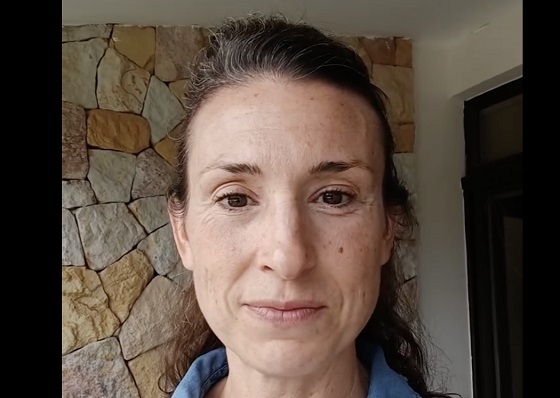
 COVID-192 days ago
COVID-192 days agoPro-freedom Canadian nurse gets two years probation for protesting COVID restrictions
-
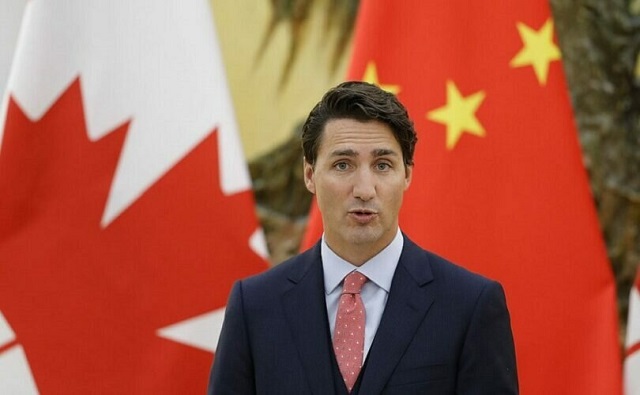
 espionage2 days ago
espionage2 days agoTrudeau’s office was warned that Chinese agents posed ‘existential threat’ to Canada: secret memo
-
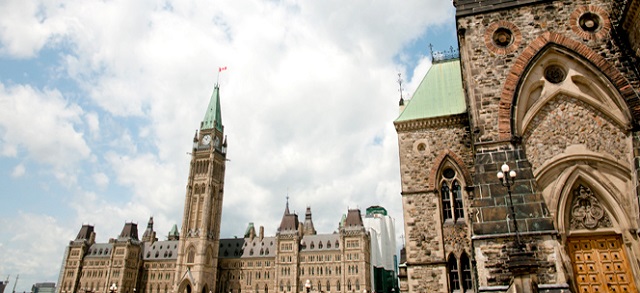
 Economy2 days ago
Economy2 days agoMassive deficits send debt interest charges soaring
-

 Business1 day ago
Business1 day agoBusiness investment key to addressing Canada’s productivity crisis
-

 International1 day ago
International1 day agoBrussels NatCon conference will continue freely after court overturns police barricade
-

 Jordan Peterson1 day ago
Jordan Peterson1 day agoJordan Peterson slams CBC for only interviewing pro-LGBT doctors about UK report on child ‘sex changes’
-
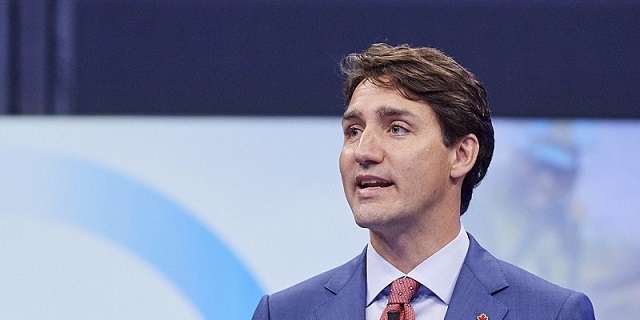
 Business1 day ago
Business1 day agoFederal budget fails to ‘break the glass’ on Canada’s economic growth crisis
-
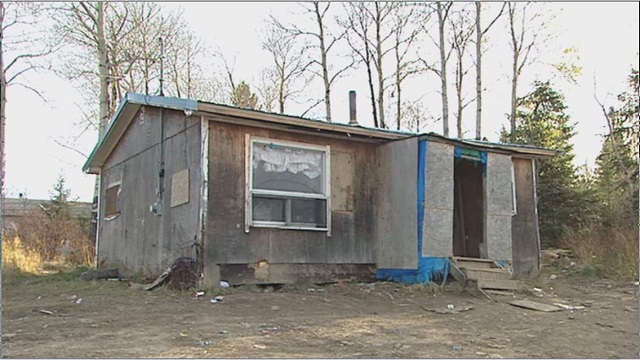
 Frontier Centre for Public Policy1 day ago
Frontier Centre for Public Policy1 day agoThe Smallwood solution


